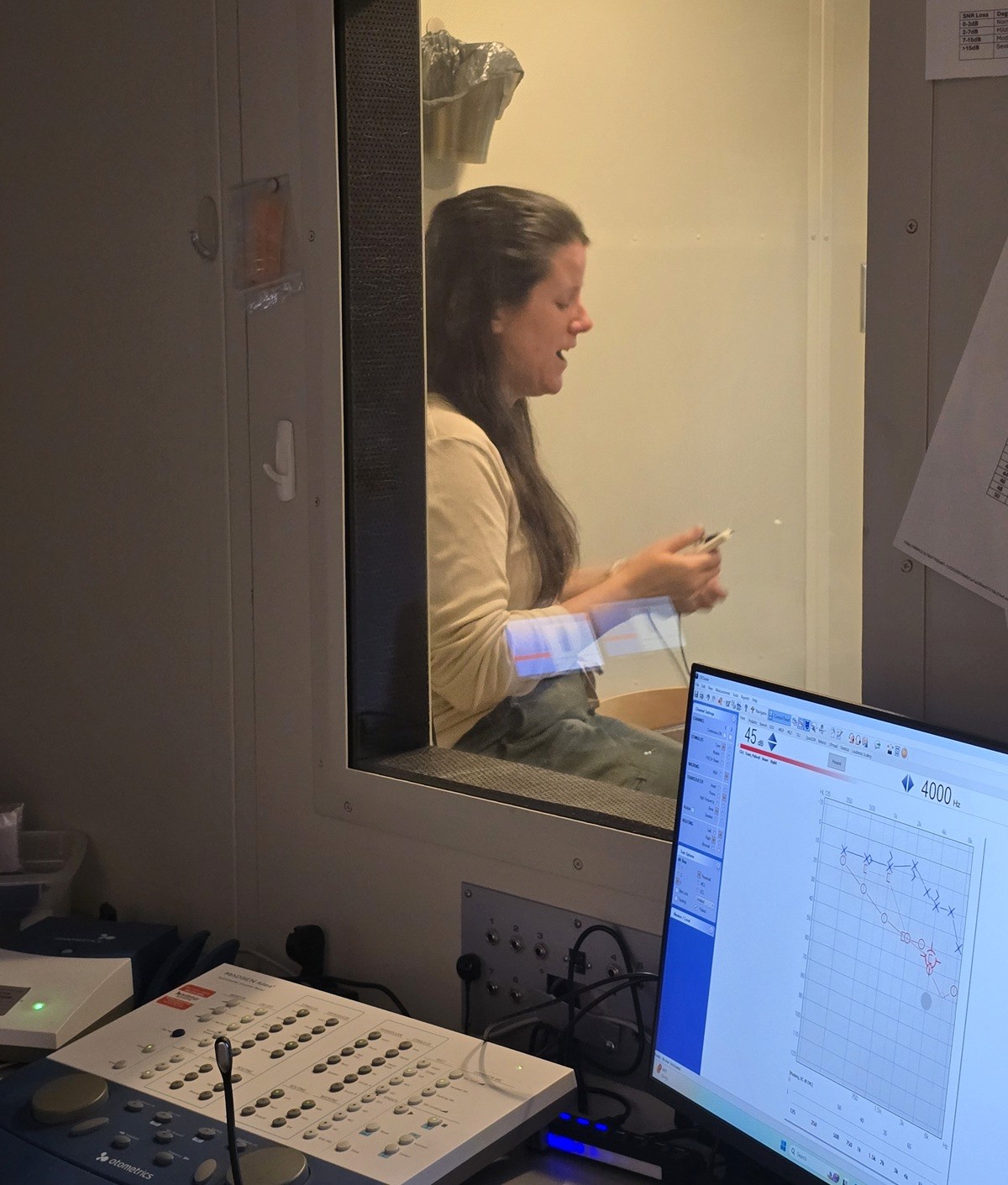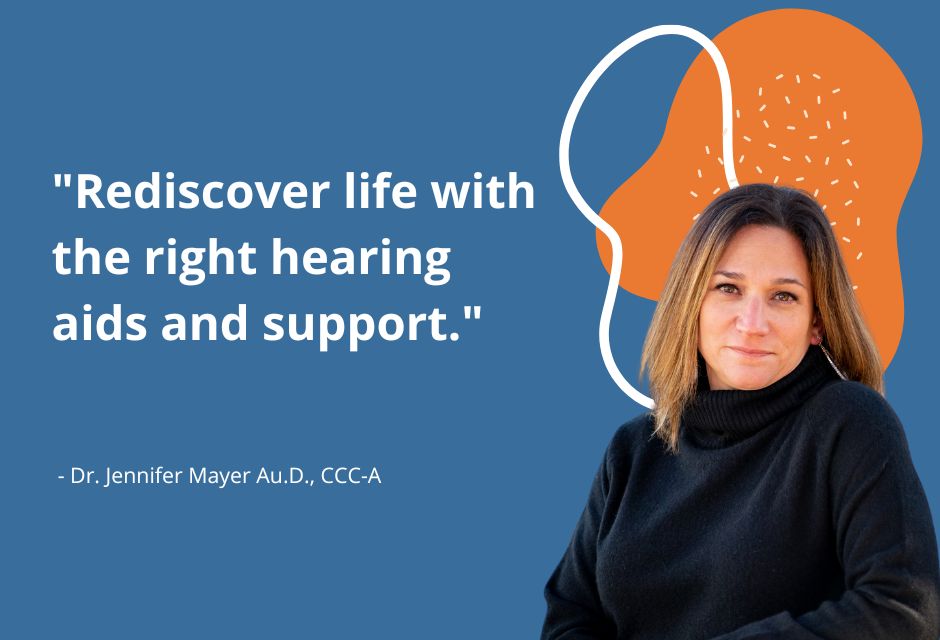Your First Step To Better Hearing Is A Hearing Evaluation
The World Health Organization predicts a doubling of hearing loss cases before 2050, so regular hearing assessments should be a critical element in monitoring your health.
What Happens During Your Hearing Evaluation?
We'll guide you through a quick, comfortable process to clearly understand your hearing health needs
Physical Examination Of Your Ears
Your audiologist will physically examine your ears in order to rule out any structural damage to your ears as well as inflammation or blockages in the ear canal.
Review Of Your Test Results
Unlike most tests in healthcare, our patients receive test results as soon as your audiologist finishes the exam rather than making you wait a few days for results to come back from the lab.
We believe in educating our patients rather than just ordering treatment, so your audiologist will show you the printed test results from your exam and then discuss what they mean. If treatment is necessary, your audiologist will discuss each available option, such as hearing aids, ototoxic medication monitoring, tinnitus management, or various other options.
If your hearing tests are normal, then your hearing care professional will suggest various lifestyle changes to prevent damage to your hearing, the use of ear protection at work or during certain activities, and other preventive measures.
The gradual onset of hearing loss makes it difficult to identify day-to-day changes to your hearing, which means that loved ones will probably notice a hearing challenge before you do. The only sure way to know whether you or a loved one is experiencing hearing is a comprehensive hearing assessment by a hearing care professional.
The 7 Steps of A Comprehensive Hearing Assessment
Welcome to a personalized approach to hearing health. At every step, your needs and concerns are at the forefront.
Step 1
Warm Welcome & Personalized Scheduling
When you first contact us, you're greeted in a warm and friendly manner, setting the tone for compassionate care. Our team is eager to assist you by identifying themselves and the clinic, ensuring you feel welcomed from the outset.
When scheduling your appointment, we take the time to talk to you and understand why you decided to come in. Knowing how you heard about us, whether through a doctor, friend, or online, helps us tailor our services to your network. To accurately prepare for your appointment, we’ll ask you for a few details, including your name, date of birth, address, phone number, and email. Getting this information in advance allows us to send you the necessary paperwork ahead of time, which makes things faster and easier when you come in for your appointment.
We’ll also ask for your insurance details and medical information, such as primary care physician or ENT referrals, to allow us to prepare accurately for your visit and ensure that you’re in-network. If any referrals or medical clearances are needed prior to your appointment, we’ll make sure you know exactly what is required.
This clarity minimizes surprises, ensuring you can focus on what matters: your hearing health.
Step 2
Comprehensive Planning for Your Visit
Whether you're looking for a routine hearing test, exploring hearing aids, or preparing for another medical procedure, you’ll be guided through every step.
If you're considering hearing aids, letting us know your history with any auditory devices or issues like wax buildup helps us prepare an effective care plan. Should earwax removal be necessary, rest assured we will direct you to suitable care providers before your test so you can avoid unnecessary delays.
Our clinics are strategically located in Sharon, Weymouth, and Hanover, and we provide flexible scheduling to suit your lifestyle. Your appointment time puts your busy schedule first, ensuring the availability of testing facilities and specialist resources to give you the time and attention you deserve. Once all details are in place, you'll receive a confirmation with all the necessary appointment logistics, including time, location, and essential pre-visit preparations.
You'll also get an email with paperwork to complete at your convenience, further streamlining your visit. We conclude our call by confirming all details one last time. And don’t forget that even after your appointment is scheduled, we are always just a phone call away!
Step 3
Initial Consultation & Evaluation
Once your appointment is scheduled, the focus is all about you. Your audiologist will review your answers from your first call so they can offer you personalized care to ensure your visit addresses your specific needs. Upon your arrival, you're welcomed into a supportive environment designed to make you feel at ease. During your consultation, you'll experience a comprehensive diagnostic evaluation, including different assessments to understand the intricacies of your hearing health.
After your hearing assessment, you'll have the opportunity to review the results together with your audiologist, which is a key part of our collaborative approach to your hearing health. If your assessment shows no struggles with your hearing, you may be scheduled for an appointment to test your hearing health again in one year’s time, just like visiting the doctor annually.
If you do have any hearing struggles, we’ll recommend further assessments or technology options to help boost your hearing health, like hearing protection or hearing aids.
Step 4
Tailored Recommendations Just for You
You can expect recommendations crafted to fit your lifestyle and specific needs. Whether you’d benefit most from advanced hearing aids, proactive listening strategies, or the best hearing protection, you receive guidance that keeps your well-being as the priority.
Should further testing be required, you’ll be guided on the next steps, ensuring a smooth process without any confusion.
Step 5
Your Hearing Technology Journey
When hearing aids are suggested, your lifestyle, listening preferences, and budget are all considered in a cooperative dialogue. This ensures that the chosen technology is perfect for you.
No matter what you choose, we’ll also be sure to keep you informed of the latest advancements in hearing aid technology. You can rest assured that our team invests considerable time learning from favored and emerging hearing technology, so you’ll always receive the most up-to-date solutions. Our team meets with and learns from each manufacturer. We take classes, attend meetings, and read journal articles to ensure we stay ahead of the game on the latest hearing aid technologies, even the ones we don’t work with as often as others!
Once you’ve made a decision for your hearing health, orders are created, agreements are signed, and appointments are made for your hearing aid fitting and follow-ups.
Step 5.5
Your Hearing, Protected
If you need hearing protection to safeguard your hearing health, you can schedulea consultation to get ear impressions made. This will involve otoscopy, which is a look inside your ears, both before and after the impression are made to ensure ears are clear pre and post impression. We make an impression of your ear using medical grade silicone that hardens and sets in place inside your ear. After your order is placed, the impression will be sent off to the manufacturer to create hearing protection that’s custom fit to your unique ears.
Step 6
Seamless Integration & Support
During your fitting appointment, whether for your hearing aids or protective gear, you’ll receive guidance through every step. From correctly inserting your hearing protection to get the best acoustic seal, to understanding and programming your hearing aid features, rest assured that our team is here to help you get the most out of your hearing health investment.
For a hearing aid fitting, there is a lot of information for you to take in: we will choose the dome sizes and you will get a tutorial on changing them and the wax guards; insertion, removal, and charging/changing batteries are explained; cleaning steps are shown and practiced. We’ll be sure to take our time so you’re clear on all the steps. Your comfort and confidence with these devices are a top priority!
Step 7
Continuing Care Beyond the Initial Fitting
Following your initial fitting, follow-up appointments are scheduled to discuss your experience and any adjustments that may enhance your usage. Your comfort and satisfaction with your hearing aids are key, which is why we plan for ongoing care every four months through our bundled service plan.
This ensures your hearing aids are clean and well-functioning and your hearing health is continuously monitored. While you focus on experiencing the world more fully, our dedicated team works tirelessly behind the scenes, from managing stock to securing the newest hearing technology. You benefit from a seamless experience designed to enhance every aspect of your auditory health.
No matter what your ears need, know that our team is here to help, every step of the way. You can rely on us for expert care that’s just a phone call away!
Who Is At Risk For Hearing Loss?
Aging is among the leading causes of hearing loss, but hearing loss can affect individuals of any age due to a variety of causes, like:
Congenital Disorders
Ongoing or frequent exposure to loud noise
Head trauma
Various illnesses and diseases
Ototoxic medications
Collateral Damage Of Untreated Hearing Loss
Research has discovered several seemingly unrelated, physical & mental health consequences associated with untreated hearing loss, including:
Decreased cognitive capacity, leading to a 1.5 times higher risk of early-onset dementia
Increased incidences of depression and anxiety
Higher risk of developing cardiovascular issues
Greater frequency of dizziness, vertigo, and falls due to poor balance






